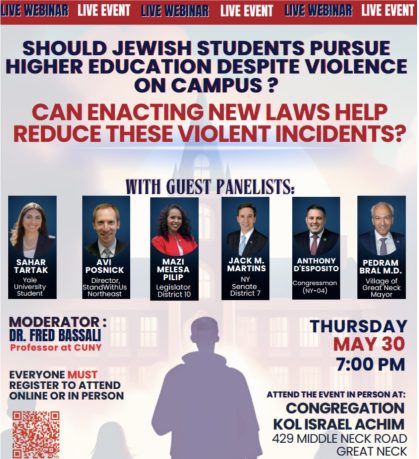Great Neck Mayor Pedram Bral said he is concerned about his children going to college and that he is “done” with the universities amid campus protests against the war in Gaza, but that he still believes they should be able to attend these schools.
“But they should never stop our children or discourage our children from striving higher and going to Harvard,” Bral said. “Not only that, I think we should really encourage them.”
Bral shared these comments in a forum Thursday night which promoted a flier that asked “Should Jewish students pursue higher education despite violence on campus?” and “Can enacting new laws help reduce these violent incidents?”
The forum was criticized before panelists convened Thursday night at Congregation Kol Israel Achim in Great Neck, with one resident saying it was intended to platform Republican politicians – the only political party represented on the panel – and to incite fear.
Panelists include Nassau County District 10 Legislator Mazi Pilip (NY-10), Rep. Anthony D’Esposito (NY-04), state Sen. Jack Martins, Village of Great Neck Mayor Bral and Stand With Us Northeast Director Avi Posnick.
It was framed around whether Jewish students should pursue higher education, which was not asked outright to the panelists. Attendees submitted questions to the panelists.
Some panelists, like Bral, addressed the question despite not being asked.
Pilip said the events of Oct. 7 and the proceeding months have been difficult for the Jewish community, which have been exacerbated by protests occurring nationwide on college campuses.
Martins said university leaders failed to protect students amid these protests.
“In order to change the trajectory, we have to differentiate between free speech and hate speech,” Bral said. “Until we do that, this thing can continue for a long time. Differentiate between hate speech and free speech. Stop the hate speech, allow the free speech and I think we’ll be okay.”
Panelists offered a variety of solutions to combat antisemitism on college campuses and in general.
D’Esposito said the first step in combatting antisemitism is holding discussions. He attributed the growing conversations on the topic to there being a Republican majority in Congress, citing the hearings with university presidents on antisemitism on campuses.
Before and after making these comments, D’Esposito said the forum was not political.
The politicians said antisemitism on college campuses can also be combatted through legislation.
Martins said the state government has the ability to defund state and city universities and their programs if they do not take action to combat antisemitism. He also called for making hate crimes bail ineligible and state and city universities to defund antisemitic campus clubs.
He said legislation has been introduced that would prevent students from receiving funds from the state’s Tuition Assistance Program or expel students who commit hate crimes.
But none of this legislation has made it to the floor for a vote, which Martins condemned as they approach the end of their legislative session.
D’Esposito said federal legislation has also been introduced that would require the Department of Education’s Office for Civil Rights to consider the International Holocaust Remembrance Alliance’s definition of antisemitism when reviewing discrimination complaints that concern federally funded programs.
He said there are plans to invite Israeli Prime Minister Benjamin Netanyahu to speak at a joint Congressional session within the next two months. He said he was texting House Speaker Mike Johnson about this moments before the forum.
Another method offered was bolstering education on Israel and Palestine as well as Jewish history.
Posnick said StandWithUs was established to educate and empower students and communities, support Israel and fight antisemitism. He said these pursuits are even more important now.
Bral said students need to be educated on the issues before arriving and be “brainwashed.”
Pilip echoed this, saying they need to be taught the “real facts” of the issue and provided a greater breadth of knowledge on the Holocaust.
Martins called for antisemitism to be included in colleges’ required diversity, equity and inclusion training, which he said is not provided.
But overall, the panelists called for the broader community to unite to combat antisemitism.
“It’s very simple, and I think we’ve learned this lesson time and again through history, and that is that evil grows when good people remain silent,” Martins said. “We see things happening in this world time and again, whether it’s outside of the U.S., whether it’s here, whether it’s on our campuses, whether it’s in our communities, and we have a responsibility to act, we have a responsibility to respond and we have, first and foremost, the responsibility to make sure in this particular case that our children, our students, professors have a safe place when they go to school.

